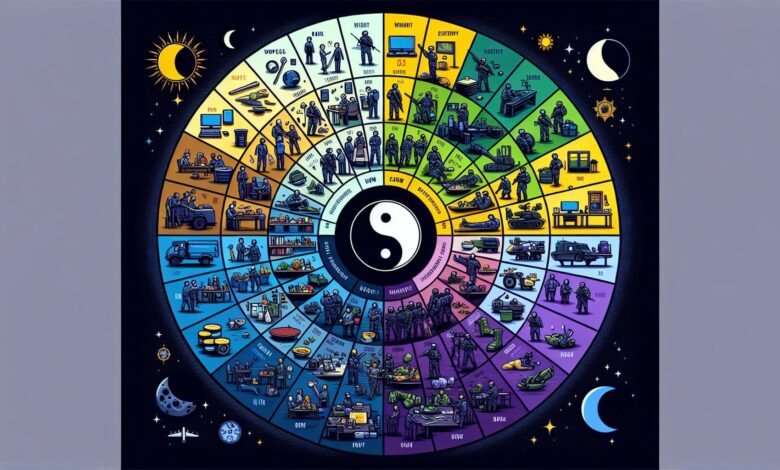What is 24-hour military time?

Most of us use a 12-hour clock in our daily lives, with AM and PM to mark the time of day. But the 24-hour clock is different. It uses military time conversion to count from 0000 to 2359 without repeating hours. Midnight is 0000 hours, and the hours increase until 2359, right before midnight strikes again.
The 24-hour military time system is all about precision. It’s used by the military, emergency services, and for flying planes. It matches up with Standard Time and Coordinated Universal Time (UTC). This avoids confusion between morning and evening times. Military time keeps things clear and everyone on track, no matter where they are in the world.
Contents
Understanding the Basics of 24-Hour Military Time
Welcome to the world of 24-hour military time! This system is important for many professionals. It provides clear and precise timekeeping. Understanding military time is key, no matter your reason.
The Difference Between 12-Hour and 24-Hour Time Formats
The 12-hour time format is common in the United States. It splits the day into AM and PM periods. This can sometimes be confusing.
In contrast, the 24-hour format, or military time, goes from 0000 to 2359. Every hour of the day is unique. This removes the confusion of morning and evening times seen in the 12-hour cycle.
How to Read the 24-Hour Time Format
Reading military time might seem daunting, but it’s simple. The first two digits show the hour, and the last two the minutes. For example, 1300 is ‘thirteen hundred hours.’ It gets easier with practice.
Converting AM/PM to 24-Hour Military Time
Learning to switch between AM/PM and military time is crucial. Add 12 to the PM time’s hour to convert. AM times are easier; just use two digits for the hour. For example, 9:00 AM is 0900. 12:00 AM is 0000, and 12:00 PM is 1200.
Knowing this system is vital for worldwide communication. It helps in computing, logistics, and precision-required fields like the military or emergency services.
Origins and History of Military Time
The history of timekeeping is both fascinating and practical. It began with the world’s oldest civilizations. The development of military time origin and 24-hour clock history changed how we keep time today.
The 24-hour time format, known as military time, started in ancient Egypt. Egyptians split the day into 24 hours. They used sundials in daylight and stars at night for this. This system was very precise, important for planning and ceremonies.
Over time, the 24-hour clock became vital, especially for military operations. It ensures precision and clear communication in the military. This was crucial during World War I. It helped troops coordinate better, avoiding confusion and mistakes in battle. Thus, all allied military forces started using this time format.
Standardizing time was crucial beyond war. It paved the way for global synchronization. Now, this system impacts military, industry, global travel, computing, and international business.
Global Use of 24-Hour Time Format
The 24-hour time format has made things clearer and more efficient globally. It is used in public transport and scientific research. This system provides a common way to measure time, which is very important in our connected world.
24-Hour Military Time in Everyday Life
The 24-hour time format is not just for the military or complicated tasks; it’s used everyday. Here are some places you might see it:
- Public transportation schedules, ensuring travelers catch their trains or flights at the precise hour.
- Computer systems, where timestamps in this format avoid confusion over system updates or process logs.
- Television and radio broadcast schedules globally, providing viewers and listeners with exact program start and end times.
International Standards for Timekeeping
The International Organization for Standardization (ISO) supports the 24-hour format with ISO 8601. This endorsement helps in:
- Promoting it as a primary timekeeping standard, which helps in synchronizing time across different technological platforms and countries.
- Facilitating a clear communication bridge in international business and logistics, where timing precision is crucial.
Even though the 24-hour system is not used everywhere, with some countries preferring a 12-hour format, it is crucial. Industries around the world depend on it. Fields like aviation, the military, and emergency services use it widely.
Advantages of Using 24-Hour Military Time
Switching to 24-hour military time brings great advantages. It ensures clarity in communication and helps in error reduction in scheduling. It’s praised for making things clearer in both work and everyday life.
This time format is ideal for avoiding mistakes. It makes sure everyone understands each other perfectly. That’s why it’s so useful in all sorts of situations.
- Precision and Clarity: Military time is indispensable for preventing miscommunications during critical operations. Its usage ensures that all parties involved in an operation are on the same page, thus minimizing the risk of errors.
- Elimination of Ambiguity: The 24-hour format is free from the ambiguities of AM and PM notations, making it particularly beneficial in environments where precision is paramount, such as in medical or military settings.
- Efficiency in Documentation: Employing military time simplifies record-keeping, scheduling, and data logging by maintaining a consistent, straightforward format across all forms of documentation.
Using military time boosts efficiency and accuracy in all you do. It’s perfect for both global projects and everyday tasks. It could be the smartest move for enhancing how you work and plan.
Practical Applications of Military Time in Various Sectors
Precise timekeeping is essential in many key areas. It’s crucial in sectors like the military, transportation, and healthcare. Using military time brings accuracy and efficiency. This 24-hour format helps keep communication and operations smooth, especially when time is of the essence.
Utilization in the Military and Emergency Services
Military and emergency services rely heavily on precise timekeeping. Accurate time is vital for coordinating tasks, handling logistics, and ensuring quick, effective responses. Military time reduces miscommunication risks, which is key during critical operations.
The Role of 24-Hour Time in Transportation and Logistics
Keeping transportation on schedule is crucial for global flow of goods and people. Airlines and railways use military time for clarity in scheduling. It helps avoid confusion between AM and PM, making transport systems run smoother.
How Healthcare and Other Professions Benefit from Military Time
In healthcare, exact timing is a must. Military time is used for logging care, tracking meds, and scheduling staff in hospitals. Its clarity and precision support 24-hour healthcare operations, directly affecting patient care.
The use of 24-hour military time in diverse sectors shows its reliability and need for accuracy. It’s vital where precision is key.
How to Get Comfortable with 24-Hour Military Time
Getting used to military time might feel hard at first. However, with the correct approach and tools, you’ll get the hang of it quickly. Here are a few practical tips and resources that will help you learn military time fast.
Tips for Learning and Practicing Military Time
- Start by linking military hours to everyday activities. For example, have lunch at 1300 or work out at 1700.
- Make it a habit to convert standard times into military format. Thinking of 3:00 PM as 1500 will make it clearer.
- Always compare 12-hour and 24-hour times to get used to the differences smoothly.
Tools and Resources for Mastering the 24-Hour Format
- Use online converters to turn standard time into military time. Doing this often reinforces what you’ve learned.
- Download apps for practicing 24-hour time. These usually have quizzes and flashcards to test your skills.
- Visit interactive websites with tools for learning military time. These can help you see how much you’re improving.
By using these strategies and tools regularly, learning military time becomes easier. It turns into an important skill that improves how you organize and communicate every day.
Conclusion
Learning about understanding military time isn’t just about rules or old habits. It’s key for global talks and working together. The 24-hour clock helps us be precise. It cuts down mistakes in all parts of life. It makes things clear and stops mix-ups, no matter where you are or what you do.
Its history shows us how widely it’s used and its great points. This timing method is smart. It was made for the strict needs of the military and emergencies. Now, it’s also in our daily lives. It makes things run smoother in healthcare, travel, and more. Using military time can make talking easier and clear up mix-ups.
Start using this time way in your day. It makes planning and meeting people worldwide easier. Let military time’s exact nature help. You’ll feel more sure when setting up your day. Let the simple beauty of the 24-hour clock make your life tidy and full.



